Stephanie M.
I'm a content writer and novelist who loves books, writing, theater, and my cat. I have published two novels and traveled to London and Paris.
Columnist III
- Plebian Penman
- Common Writer
- Aristocratic Author
- Noble Scribe
- Lurker
- Pssst
- Hand Raiser
- Vocal
- Outspoken
- Extrovert
- Center of Attention
- Forms a Crowd
- Sharp-Eyed Citizen
- Town Watch
- Detective Deskman
- Penman Patrol
- Forensic Fiend
- Motivational Columnist
- Motherboard
- Composition
- Literary Art
- Referencer
- Actor
- Successful Pilot
- Animator
- Animaniac
- Well Read
- Chaptered Mind
- Art Collector
- Article of the Month
- ?
- Articles
37 - Featured
33 - Comments
668
- Ext. Comments
319 - Processed
183 - Revisions
180
- Topics
78 - Topics Taken
5 - Notes
243
- Topics Proc.
74 - Topics Rev.
16
- Points
12303 - Rank
4 - Score
8476
Latest Articles
Latest Topics
Published | Why Writers Love WhumpWithin the fiction writing community and especially on social media outlets like Tumblr, there is a particular type of writing that draws a subset of writers. This writing type is called "whump." Broadly defined, "whump" happens when one character gets hurt, physically, emotionally, or otherwise, and must receive care from another character, or conversely, endure the trauma alone. Whump can take many forms and be as innocent or graphic as the writer wants, although most writers will post trigger or content warnings if they intend to go into certain details. Graphic or not though, many writers confine their enjoyment to whump communities for fear of being misjudged as sadists, masochists, or otherwise unstable. Others write whump to the exclusion of other types or scenes, which may raise questions about their growth in the craft of writing. Examine the many reasons why fiction writers love whump. Are they all looking for catharsis for their own trauma? Are some of them caretakers who enjoy seeing characters rescued and nursed to health? Why do you think these writers get judged for liking and creating whump content, whereas a whump reader is less likely to be judged for reading a violent or horror novel? Are there some forms of whump that take the concept too far? And perhaps most importantly, what does this type of writing offer to the fiction community, that no other writing does?
|
How Will the Current Culture Affect Classic Novels?Most of us grew up with some form of the classic novel. Whether we read abridged, illustrated versions for kids, encountered them in school, or watched TV or movie versions (e.g., Wishbone, Disney adaptations), most of us know at least some of the traditional "classics" of the Western canon. These include but are not limited to works by Dickens, Steinbeck, Morrison, Lee, Shakespeare, Austen, and Wells. As our culture becomes more aware of concepts like marginalized experience and cultural appropriation though, our relationships with classic literature may change. We now critique certain examples of classics because of what they imply about non-Western, non-white cultures, or what they leave out. We critique them based on the roles women do or don’t play, or how characters of color are treated, or whether characters coded LGBT are sympathetic. As a disabled woman, I find myself being harsher with books like Of Mice and Men or The Color Purple because of how they treat members of my groups. How does this heightened critique and awareness mean we should treat the classics? That is, can we still learn valuable things from these books even if they are cringe-worthy in their rhetoric or character portrayals? How can we engage with these books, without spending all our time on the problematic parts? Some of these classics have been retold because of heightened critique; was this a good or bad idea? And, are these critiques even valid, or should we simply say, "This was written in another time and we should simply accept that?" Discuss.
|
The Cancelling of Sapphic and Women's-Centered SeriesSocial media is buzzing about a disturbing, but not necessarily new trend–the cancelling of sapphic television series, especially on streaming services like Netflix. "Sapphic" refers to content "of or relating to sexual attraction or interplay between women," and disgruntled and confused viewers aren’t seeing enough of it. They point out the short-lived nature of once-popular series such as The Baby-Sitters’ Club (2020) and Paper Girls, to name only two. Even more disturbingly, some series that might not be called sapphic, but are certainly women-centered, have been cancelled, were panned by critics, or have disappeared into long hiatuses. (See Gilmore Girls: A Year in the Life, Chilling Adventures of Sabrina, and Anne With an E for examples). Discuss why these series, especially on Netflix, might have been disproportionately represented on the chopping block. Do the "powers that be" see women-centered content, particularly the sapphic, as a threat, and if yes, why? Do cancellations happen just because of the nature of Netflix–shorter seasons and encouragement of "bingeing"–but if yes, why is male-centered content not cancelled as well? Do female viewers want different types of content, and if yes, what do they want? What would it take to bring female-centered shows, sapphic and otherwise, front and center on streaming services again?
|
The Impact of Blue and BlueyA popular meme showing Blue of Blue’s Clues fame and Bluey of the eponymous Australian cartoon reads, "Every so often, a blue dog appears to guide a new generation." Tongue-in-cheek humor aside, one cannot deny the popularity and relevance of Blue and Bluey for millennials and Gen Z in particular. Examine and analyze these two blue canines, their compatriots, and their shows. Compare and contrast them. What makes them both so engaging, yet unique to the generations at which they were originally aimed? What makes both so special for both the children and parents who watch them now? Why have both shows succeeded in netting older "periphery demographics" (e.g., older elementary students) where other shows have not? Or conversely, if one show or the other drove, or is driving, other older viewers up the proverbial wall, why is that? |
The Rise of the Split Time NovelCurrently, split time novels are some of the most popular in the fiction market. These novels usually pair a historical protagonist with a contemporary one, connecting their stories across time through similar themes and motifs or sometimes a significant object or event. For instance, one protagonist might have lived through World War I or II, and the other might be that protagonist’s grandchild or great-grandchild looking for answers regarding what happened to that grandparent during the war years, but the other family members never talk about. Despite the popularity of these stories, they’re arguably becoming formulaic. Some time periods and plotlines are becoming overdone. For instance, it is no longer uncommon for World War II to be the featured historical period. A contemporary protagonist is often drawn to care about the past only if he or she "gets something out of it," such as a promotion at work or a "last chance" to connect with a grandparent dealing with dementia (the question becomes, why didn’t the grandchild ever attempt to connect before)? Discuss some of the more popular split time novels and what sets them apart from their myriad counterparts. Discuss what historical time periods aren’t being taken advantage of right now that could be, or what plotlines contemporary characters could experience. For instance, could time travel be a possibility? Body or identity switches? Historical and future timelines?
|
The Arts' Love of All Things WinterDisney’s Frozen burst into our theaters and onto our small screens in 2013, and no one has "let it go" since. The film became a franchise, with rumors of a third installment coming in 2023 or later. But Frozen is not the only wintry tale media consumers love. "Winter tales" can be found across mediums, from TV series like Game of Thrones whose tagline is "Winter is Coming," to a plethora of books with titles like The Snow Child, WinterFrost, and Girls Made of Snow and Glass. Many of today’s super-powered or "chosen one" protagonists also have winter-related powers; Queen Elsa might be the most obvious, but there is also Jack Frost from Rise of the Guardians, as well as Freya from Snow White and the Huntsman. Winter permeates the arts, no matter the season. Yet what is it about this season, out of four, that captures the imagination of writers, filmmakers, and other artists? Analyze a few prevalent winter tales across mediums, looking for commonalities among characters, character arcs, plot threads, powers, and more. Could the other three seasons garner this kind of attention, and if yes, what would it take to make that happen? Are artists, authors, and others who craft "winter tales" trying to make a statement about their art, themselves, or humanity through winter? If yes, what is it? Discuss.
|
The Blending of Christianity and HorrorThe most recent horror film on Hollywood’s docket is Prey for the Devil, which concerns Sister Ann. This devout nun wants to be an exorcist and would be great at it, but her training school accepts only men. Yet Sister Ann may be the only one who can help the patients in the school’s attached hospital for the possessed, including a ten-year-old girl. The blending of Christianity and horror in this film is by turns respectful to the Church and seems to encourage audiences to explore, if not root for, the demonic. It’s a conundrum found in many similar films, such as The Exorcist and The Nun. The question is why this blend comes up so often, and especially why the Catholic Church is presented on the front lines in this murky battle between good and evil (they aren’t always on the "good" side). Are these portrayals as balanced as they could and arguably should be? How can or should horror films stay true to their genre, while portraying Christians or perhaps people of other faiths, as those who would protect or save innocents from the demonic? What do these films say about spiritual battle lines in real life? Discuss.
|
Analyzing the Nostalgic '90s Sports FilmThe ’90s is fairly famous for several family-oriented, nostalgic sports films. From Angels in the Outfield to the Mighty Ducks trilogy, from the Air Bud franchise to Like Mike, Miracle, and Space Jam, during the decade, these films seemed to be everywhere. At the time, they were lauded as feel-good films the whole family could enjoy, particularly dads and uncles who might be moved to tears by memories of their former glories on the field or court. In the ensuing decades, these films are still respected, but also maligned as corny or overly inspirational depending on who you ask. Analyze the impact of the nostalgic sports film. Why did ’90s audiences seem to need so many of them, and why did they all seem to have such an inspirational format? Did they cater to a specific audience with a specific set of beliefs or aspirations? Were they meant to? Are they seen as overly nostalgic now simply because audiences have changed, or do we get our "heart" and "inspiration" in different ways? If the latter, where do we get it? Can the family-oriented, nostalgic sports film make a comeback? If so, what should it look like? |
Latest Comments
| Classic Literature's "Infinity Girls" | |
@Siothrun: You are so welcome! | Classic Literature's "Infinity Girls" |
@meki: Personally, I think she might well have been, but of course, there’s no way to know that. And yes, her representation is *on point* for the 1840s. | Classic Literature's "Infinity Girls" |
@pierce: Not the whole Emily trilogy, but most of it. And yes, I love Emily, too. I’m not even gonna say I like one or the other “better”; I see them as, not carbon copies, but very much “sisters.” If I can get permission to do another article like this (as a follow-up), I want to talk about Emily. | Classic Literature's "Infinity Girls" |
@Joker: You know, it really is amazing what young kids can do with theater. My niece was in Finding Nemo, Jr. in the fall (she’s six), and the cast members with lead roles were middle-schoolers. I honestly thought some of them were older. The dedication and skill level were legit inspiring. | Classic Literature's "Infinity Girls" |
Oh, dear. How awful for her. 🙁 | Classic Literature's "Infinity Girls" |
@Dorito: Yes, you do! I just had another thought, too. Anne had never tasted currant wine, which, she’s a kid so okay. BUT, she had also never tasted raspberry cordial, which was (is)? a child-friendly drink. And I’m guessing parents back then had different views on what constituted “junk food,” but Anne of Green Gables reads as if cordials were commonplace. So if that’s true, Anne was just that much more deprived as an orphan and foster kid. As in, she probably rarely, if ever, had *anything* that would give her pleasure. She probably saw the smallest things as luxuries and treats. And now I’m sad, but in a good way. | Classic Literature's "Infinity Girls" |
@Yuliana: Thank you so much for sharing your story. It means a lot to know there are kindred spirits in this world, even online. | Classic Literature's "Infinity Girls" |

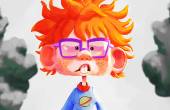
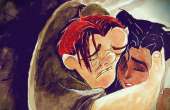
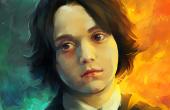

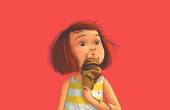
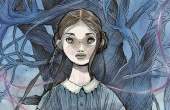
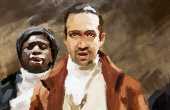
@noahspud: An angle I did not consider, but true. In fact, another thing that’s probably happening to these real-life girls is that, they’ve been treated as MPDGs their entire lives. Or they’ve been praised for being gifted or “special” or whatever–until they get to adulthood. And then their burnout or struggles get misconstrued as, “You’re no fun,” “You’re weird,” “You’re too mature/immature,” whatever. I speak from experience. So as in childhood, they remain without a place they “fit.”